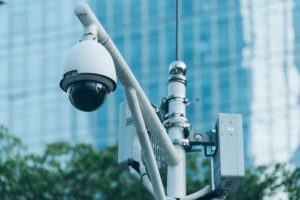The Ministry of Finance proposed to create a single centralized platform for storing and processing information of all urban video surveillance systems in Russia. Currently, only half of the cameras installed at the expense of the state are connected to regional centralized systems. And the authorities have no access to private cameras at all.
At the strategic session on the national project "Data Economy", the Ministry of Finance proposed to create a single platform for storing and processing information of all urban video surveillance systems in Russia, Kommersant writes. A single platform will be able to connect to regional systems. The video stream will be analyzed using face and image recognition mechanisms.
Now only half of the cameras that are installed at the expense of the state are connected to centralized systems in the regions. The regional authorities do not have access to private cameras. The ministry clarified to the publication that "certain categories of owners" will be required to install and connect video cameras at their own expense.
Centralization of the video surveillance system, according to officials, will, among other things, increase the detection of crimes by 30%.
The Ministry of Finance expects that in 2030 the number of video surveillance cameras in the country will grow to 5 million and all of them will be connected to AI systems capable of processing the video stream. According to the Ministry, 1.2 million cameras are currently operating in Russian cities.
Ilya Mukha, digitalization manager of Reksoft Consulting's Transformation Strategy practice, told the publication that the task "requires not only serious equipment for storing, processing and streaming video analysis using artificial intelligence, but also communication channels, redundancy, and a large highly qualified team."
The Ministry estimates the cost of developing the platform at 12 billion rubles. The interlocutor of the publication in a large IT company believes that streaming video from video surveillance systems in the subjects to a centralized national database will require "five or six times more costs than the Ministry of Finance lays down" due to the need to purchase and maintain a large fleet of computing power to process data arrays.
According to the interlocutor of the publication, the decentralized organization of intelligent surveillance systems will be more cost-effective.
Another source familiar with the organization of video surveillance systems in Moscow and the regions believes that data centralization does not make practical sense: "Data on incidents in the regions are needed by services in the regions, there is no need to transfer them to the national platform, it is very expensive, low-functional for all consumers of video information and will not be used by local services."
Doubts about the idea of such centralization in October 2022 were expressed by the president of the Association of Data Center Industry Participants Igor Dorofeev. At that time, a state contract was discussed at the RTS-tender site for the completion of a single data storage center in Moscow so that it could receive and process video recordings from street video cameras from other regions of the country.
"There is no logic in this, because there is a worldwide trend towards the decentralization of peripheral computing. And here they want to transfer the entire huge volume of raw video data to Moscow. Very strange. It would be one thing if something was being processed in the regions, and this processed information was already being forwarded," Dorofeev said.

